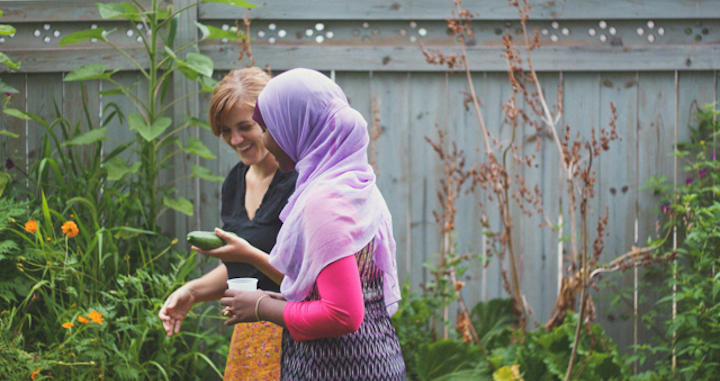Over a decade ago, I met my first Somali Bantu refugee family and became smitten with them, sucked into the complexities of their lives as they navigated cultural and class and racial prejudices in America. I became so absorbed in their lives, in fact, that I ended up getting a Master’s degree in teaching English and specializing in adult literacy, and living and working within apartment complexes with a large population of Somali refugees–which eventually landed me and my family in Minneapolis.
I was shocked when I landed in Minnesota and discovered the diversity of my new state. There were over 100, 000 Somali refugees alone. My new neighborhood was in the hub of this community, and there were restaurants and entire malls where I would not see a single other white person. I taught English at high-rise apartment complexes comprised mainly of refugees and immigrants from East Africa. I bought $1 sambusa at the corner grocery stores. I smiled at the women in hijabs I saw everywhere. Sometimes, I had to pinch myself. Was this real life? Every day in SE Minneapolis felt like my birthday.
But not everyone feels like I do. I remember a nice Christian man in Minnesota who wanted to talk to me years ago. “They say in the refugee camps in Kenya, one of the first English words that everybody learns is Minneapolis.” The urgency in his voice belied a belief that his homeland was being invaded.
America may stumble through an extended hangover from this election, but when the fog clears we will look back and see that Donald Trump’s campaign rose on an extreme wave of anti-immigrant fear. All of his talk about building a wall and banning Muslims was about courting that man’s fear.
On a recent episode of “This American Life, ” reporters went to St. Cloud, Minnesota, a town about 2 hours outside of the twin cities. In the past few decades, this almost exclusively white small town has experienced an uptick in resettlements. Minnesota is home to large resettlement agencies, including Catholic Charities and Lutheran Family Services. It offer some of the best state benefits in the nation, and has plenty of jobs (including animal processing) for those who are willing to work. Horrible winters notwithstanding, Minnesota is an attractive place for new immigrants, and the numbers have continued to grow.
But many long-term Minnesotans feel as though everything is changing too fast. And they are scared. I marvel at the graciousness of someone Ayan, a Somali activist who says she would tell her frightened neighbos the same thing she tells her 3 year-old: “it’s ok to feel scared. It’s ok to feel angry. It’s not ok to slam doors.”
But when I hear people talk about their fear of Muslims or Sharia law overtaking America, I am not as calm as Ayan. I get afraid, Fear starts to freeze my very core. I am afraid because Trump’s American is where I came from. Republican, conservative, Christian, white, blonde-haired and blue-eyed, lovers of God and country, we go on mission trips around the world. People I know and love spend hours reading about how Muslims are trying to sneak into their country and convert their grandchildren, or worse. I listen to them talk, I hear the fear and misinformation, the hyper individualism, the fierce denial of both systemic injustice and civic and global duty, and it suddenly becomes clear: this is no longer my community.
But where do I go?
I feel safest surrounded by my neighbors. Currently, they are refugees and immigrants from Somalia, Afghanistan, Iraq, Syria, Myanmar, Mexico, and a host of other countries. The women cook me food and drop it off in the evenings. We walk back and forth to school five days a week. We commiserate about rising rent costs. Most of them are Muslim, and sometimes we talk about God. In many ways, I am more comfortable around refugees. They are the ones who first revealed to me, after all, both the depths of human suffering and the deep wells of resilience to be found in humanity. They are a daily, living reminder of the cost of war and the effects of trauma, of the joys of diversity and the destructive nature of the myth of the American dream. They make it so that I can never go back to the world I came from, a world where me and my own little family were the only ones I cared about.
This election season has been traumatic for so many groups. As a white evangelical woman, my grief and fear pales in comparison to those from minority groups who were targeted by Donald Trump’s campaign as enemies who’ve tarnished America’s greatness. I have been forced to reckon with the divide that has grown this entire time. The people I was raised to look up to, the male leaders of the white conservative Christian world, have disregarded the people I love.
Because I fell in love with refugees, I cannot be a part of a movement that doesn’t have space for them. Moving forward, I will be navigating a new paradigm, learning from new (and more diverse) leaders.
And I will be learning how to be an American from people who are experts at rebuilding from the ashes of life.

